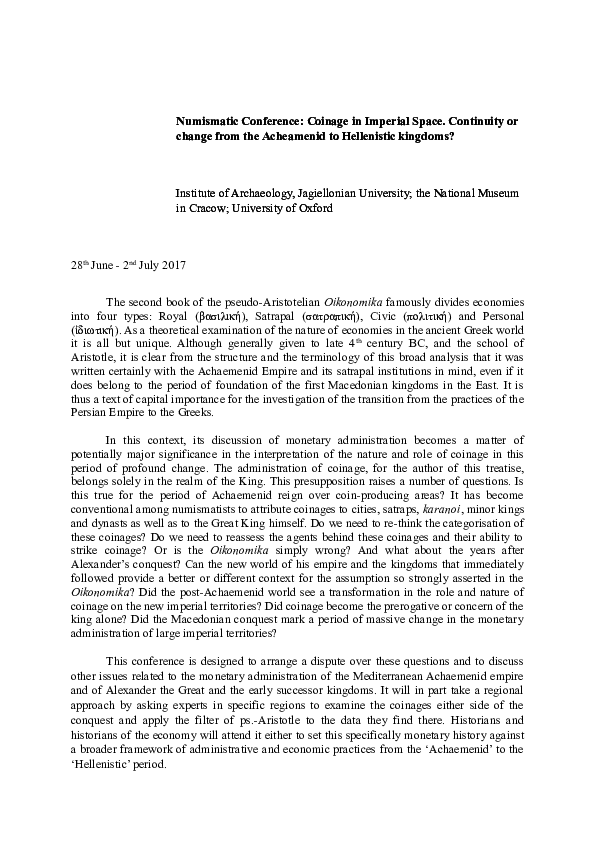Academia.edu no longer supports Internet Explorer.
To browse Academia.edu and the wider internet faster and more securely, please take a few seconds to upgrade your browser.
Conference CIIS.docx
Conference CIIS.docx
Related Papers
With Alexander III, the issues of gold coins in Greece grew steadily for several factors, first of all the availability of metal, but also the need for large amounts of money for the maintenance of the army, the payment of the veterans and the establishment of a sovereign state that could have a monopoly on the minting of coins. Recognising the economic and political importance of having a uniform coinage in his empire, during his advance Alexander took over existing mints in the places he conquered and produced a prolific minting, while at other sites new mints were established where none had existed before. The longevity of the Alexandrian coinage was a unique phenomenon in Classical antiquity: in all, about 114 different mints produced Alexander coins over a period of 250 years. This paper is focused on the gold coins issued by Alexander III beetween 336 and 323 BC throughout the empire.
This paper sums up how coinages were fundamental for the policy of Hellenistic kings competing between themselves. It exemplifies the common pattern along which coins were primarily struck for military expenditures, and above all to pay mercenaries. The Pangean mines first, the extravagant booty made by Alexander in the Persian treasuries second allowed to monetize precious metals on an unprecedented scale. Quotations are given to relevant literature in Plutarch, Pliny, Arrian, Diodorus, Saint Augustine, Atheneaus, Plautus, Terence and Polybius. In addition, Two poems of Cavafis (Orophernes and Philhellene) are fully given for the way they capture the spirit of these troubled times.
Alexander the Great, a Linked Open World. ScriptaAntiqua 116
Minted Silver in the Empire of Alexander: Old Bullion and NewAlexander the Great and Propaganda
Coinage as propaganda: Alexander and his Successors2021 •
The coinage of Alexander the Great primarily served a practical economic purpose, as might be expected of any currency in circulation, both ancient and modern. Armies had to be paid, and ambitious campaigns required financing. But this functionality aside, coins remain an indispensable form of evidence for the study of history for what they can reveal about the issuing authorities' policies and ambitions. One of the most interesting aspects of coinage is how a ruler might employ it as a tool to convey important aspects of their leadership they wish to promote, essentially using coinage as a form of propaganda. Due to their portable nature and the fact that coins have the potential to circulate widely and reach a varied audience, these objects are especially suited to this task. The term 'propaganda' often has particularly negative connotations. It usually describes a political use of deliberately misleading and biased information promulgated for the benefit of a political party. In the present context, the term is used more in the sense of presenting a carefully cultivated public royal image. Alexander was well aware of how to present such an image and took steps to ensure that he could exert as much control as possible over how he was perceived by his subjects. 1 Coinage is just one of the tools Alexander employed towards these ends, and his approach here is consistent with his actions and policies across other mediums, which could be employed similarly towards the creation and maintenance of an ideal royal persona. This was achieved most obviously through artistic formats such as sculptures or paintings but was complimentary to Alexander's behaviour, affectations, and public acts, all of which were deliberately intended to invoke positive ideas about Alexander as a leader. A study of Alexander's numismatic policy forms part of this story and is especially interesting as it reflects Alexander's position and political intentions, with certain changes corresponding to developments in his status and ambitions as his reign progressed. This chapter aims to discuss some of the ways in which Alexander used coinage in order to promote associations that were useful to the image of his kingship, as well as the general ways in which the control and Chapter 10
M.-C. Marcellesi and S. Kremydi (eds), Les Alexandres après Alexandre: histoire d'une monnaie commune. Meletemata, (Athens, 2019), pp. 63-87
Invasion and Transformation. The development of the civic Alexander coinage in Western Asia Minor, c. 323 to 223 BC.2019 •
Journal of Ancient History and Archaeology
Athenian Mercantilism: A New Approach to the Coinage Decree & the Law of Nicophon2019 •
J. Ma, N.Papazarkadas & R. Parker, eds., Interpreting the Athenian Empire. London, 2009
What about coinage? Ch. 8 in Interpreting the Athenian Empire (2009).in NOMISMA. La circulation monétaire dans le monde grec antique, Actes du colloque international, Athènes, 14-17 avril 2010, BCH Supplément 53, 2011, pp. 185-198
RELATED PAPERS
حلقههای گمشده / برگهایی از تاریخ اقتصادی و اجتماعی ایران عصر صفوی (مجموعه مقالات)
Halqeh'ha-ye gomshodeh2023 •
Schriften aus der Fakultät Geistes- und Kulturwissenschaften der Otto-Friedrich Universität Bamberg
Spatial monitoring of the Bremen Cog - Long-term preservation of archaeological wooden ships in museums2023 •
Trends in Statistical Codicology
Canons and ‘Recipes’ for the Layout of the Medieval BookThe morphology and phonology of exponence. Oxford: Oxford University Press. Available at http://ling. auf. net/lingBuzz/001099
Exponence, phonology, and non-concatenative morphology2010 •
Verbum Cadernos Pós-Graduação
A VERACIDADE DO ROMANCE DE FORMAÇÃO, PRESENTE NA OBRA, NIKETCHE: UMA HISTÓRIA DE POLIGAMIA, DE PAULINA CHIZIANE2024 •
2018 •
2011 •
Innovation in Aging
In Their Own Words: How Family Caregivers of People with Dementia Define Resilience2017 •
ZONGULDAK ELEKTRİKLİ SANAYİ TİPİ ISITICI
0506 715 53 10 ZONGULDAK ELEKTRİKLİ SANAYİ TİPİ ISITICIComptes Rendus de l'Académie des Sciences - Series III - Sciences de la Vie
Putative neurosurgical transmission of Creutzfeldt-Jakob disease with analysis of donor and recipient: agent strains1997 •
RELATED TOPICS
- Find new research papers in:
- Physics
- Chemistry
- Biology
- Health Sciences
- Ecology
- Earth Sciences
- Cognitive Science
- Mathematics
- Computer Science


 Coinage in Imperial Space
Coinage in Imperial Space